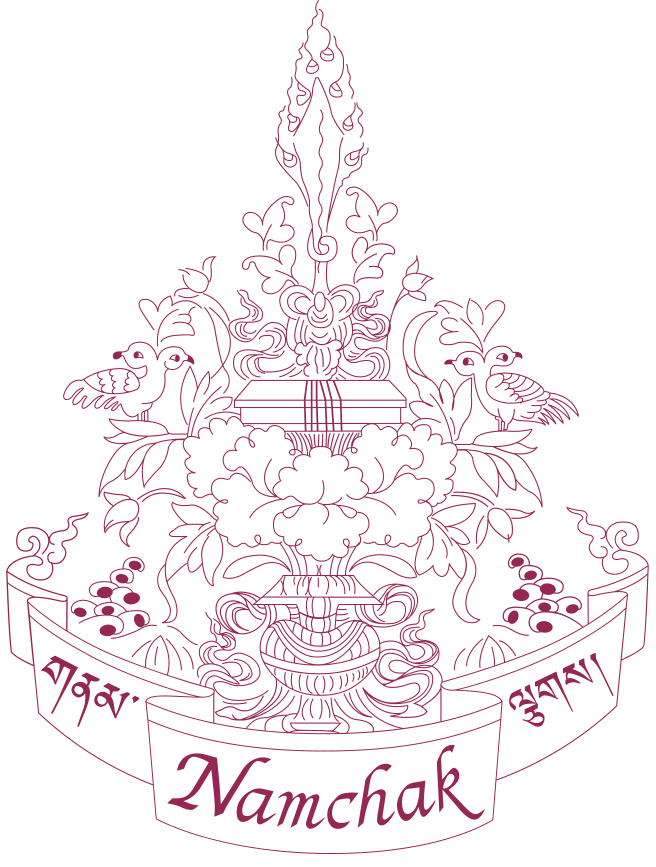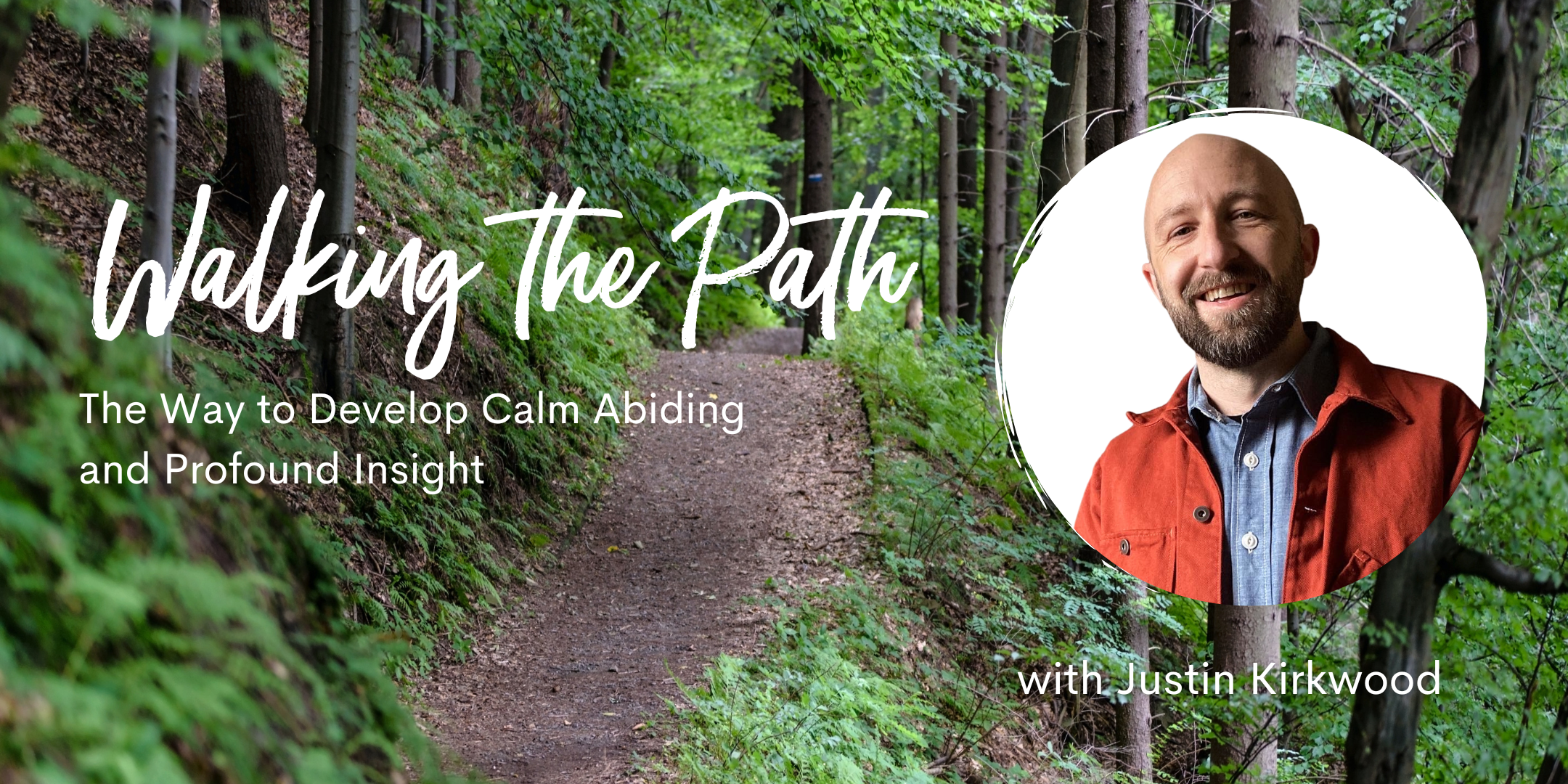In this day-long teaching with Namchak teacher and translator Justin Kirkwood, we will explore the practice of Calm Abiding. This teaching will contain explanations of the practice as well as group practice sessions.
We have already offered a full-weekend retreat with extensive explanations of these practices, and we wanted to extend the opportunity for students to join this program by offering a “catch-up” day of teachings. This means that all students enrolling in this teaching are expected to watch the full weekend of recordings from the previous retreat before attending this teaching. The link to these recordings will be available in the confirmation email from Eventbrite that you will receive after registering.
What to expect from this program:
In our new Walking the Path program, clearly outlined practices build upon one another with prescribed timelines. Throughout the program, there will be ample opportunities to have regular check-ins with Namchak Khen Rinpoche and/or his translator Justin Kirkwood to clarify your meditation practice. You will also have the chance to join a Learning Circle with others from your cohort. Recommended and required readings will accompany the practices. Namchak Khen Rinpoche is the primary teacher of the Walking the Path program. However, due to Khen Rinpoche’s recent medical issues, he is currently resting in Taiwan, and his translator Justin will be leading the teachings.
This new program includes relying upon the Buddha as our teacher, the Dharma as our path, and the Sangha as our helpers. We will take refuge, generate bodhicitta, and end each session with dedications and aspirations. By developing a mind of renunciation, we will focus on attaining liberation and Buddhahood for the sake of all beings. The first year of retreats can be attended either in-person or online. If a student wishes to continue onto year two, they would need to attend in-person to take their refuge vows.
Who this program is for:
Those who are already practicing Buddhists or those who are interested in beginning to walk the Buddhist path to enlightenment.
Tuition:
Our intention is to make this program financially accessible to all, so we offer a tiered fee structure. Please choose whichever level works best for you.
If program costs present a financial barrier or you are interested in a stipend to offset the cost of childcare, please contact amanda@namchak.org.
To register for year one of the two-year program comprised of two retreats and four individual sessions with Khen Rinpoche and/or Justin Kirkwood:
Initial Deposit – $50 – For those who do not have the finances to pay for the first year of the program upfront and would like to put down a deposit and schedule a payment plan.
Initial Deposit – $100- For those who do not have the finances to pay for the first year of the program upfront and would like to put down a deposit and schedule a payment plan.
Supported – $350/yr – For those with limited financial resources who will benefit from participating in the Walking the Path program. This reduced fee will be supplemented by the community.
Suggested – $550/yr – For those with sufficient financial resources who can pay for the experience without difficulty.
Sponsored – $750/yr – For those with the financial resources and the desire to support access for others. Your fees, in excess of the actual cost of offering the Walking the Path program, will be used to provide scholarships to those who cannot afford the full program.
*If you are choosing to pay an initial deposit, Namchak staff will be in contact after the weekend of teachings to help you organize a payment plan that works for you.
Details:
Online – Zoom link provided upon registration.
Please note: Confirmation emails from Eventbrite often end up in spam/promotions tab. Please check there if you do not see the confirmation email.
Preliminary schedule:
June 3, 2023
10am-12pm; 1-3pm MDT (please note Mountain Daylight Savings Time)
Upon registration, you will be provided a link to download a free digital copy of The Way to Develop Calm Abiding and Profound Insight by Tulku Sangak Rinpoche.
FAQs
Do I need to be a Buddhist to practice these meditations?
No, participants do not need to be Buddhist to join. However, if after the first year of Calm Abiding practice, participants wish to continue on to year two, which covers Profound Insight (vipassana), they must come to the retreat in-person to take refuge vows (the ceremony of formally becoming a Buddhist). If you are uncertain if you are ready for or interested in taking refuge vows, you may join for the first year of calm abiding practice and decide later.
How should I prepare for this retreat?
The foundation for this program is from the text The Way to Develop Calm Abiding and Profound Insight by Tulku Sangak Rinpoche. Upon registration, you will receive a link to download a free digital copy. You will also need to watch the recordings from the previous retreat of teachings that will be sent in your confirmation email as well.
Additionally, in order to develop the calm abiding focused upon enlightened speech, in your free time outside of meditation sessions, it is recommended that you study the second and third chapters of The Nectar of Manjushri’s Speech: A Detailed Commentary on Shantideva’s Way of the Bodhisattva.* This can be done after the retreat.
*Namchak does not receive any monetary or other benefit from the purchase of The Nectar of Manjushri’s Speech.
About Justin Kirkwood:
Justin Kirkwood is a Buddhist teacher and Tibetan translator at the Namchak Foundation. His many years in India of traditional monastic training, personal practice, and experience as a translator make him uniquely qualified to share these teachings in a way that is grounded in the Buddhist tradition while meeting students where they are with their unique spiritual interests and goals.
About Namchak:
Namchak brings ancient meditation practices to modern life through online learning, in-person retreat, and a vibrant community guided by Tibetan masters and Western teachers. We support students on every step of the path, from those exploring mindfulness for the first time to more experienced students looking to deepen their practice. We offer a variety of learning programs, including in-person teaching, small group learning, online courses, and soon-to-be established residential retreats at the Namchak Retreat Ranch in western Montana.
About Namchak Khen Rinpoche:
Khen Rinpoche completed the study of all the Indian Buddhist philosophical traditions and the Nyingma School of Tibetan Buddhism under numerous great teachers. He also completed the nine years of rigorous training and served at the Namdroling monastery for several years. Enthroned as Khenpo by HH Penor Rinpoche, he taught at the Shedras of Ringo Tulku and Shechen Monastery for many years, as was instructed. Khen Rinpoche strictly abides by his precepts in everyday life and is diligent in his practice. He visits and teaches a variety of places around the world, including the Namchak Foundation and the Namchak Retreat Ranch, Taiwan, Hong Kong, and other locations. While in the U.S., he resides and meditates at the Garden of One Thousand Buddhas in Arlee, Montana.
“Khen Rinpoche is one of my favorite teachers. His ability to weave humor and stories into these profound teachings makes it an absolute joy to learn with him.” – Joe Previte, Namchak Student
Our Community Commitments
In order to co-create a brave, inclusive, anti-oppressive and learning centered space, in our community we each agree to:
- Be inclusive of diverse opinions and backgrounds through treating each other with respect and appreciation.
- Commit to words and actions of non-harm within our group interactions.
- Learn by immersing in and committing to the practices at hand.
- Hold personal sharing in confidence.
- Be present, practice mindful listening, and not offer unsolicited advice.
- Allow and invite for equal sharing of voices as well as the right to pass.
- Take care not to speak for others in the group.
- Assume good intent and come from a place of curiosity and care.
- Come as we are with permission to be “raggedy.”
- Be mindful of and take personal and collective responsibility for our own biases including the use of language that may “other,” “cancel,” or dehumanize any person, groups of people, and/or their experiences.
- Ask for consent before hugging or initiating physical contact during in-person gatherings.
- Use the “Ouch/Oops” tool to address hurtful comments and language in the moment and to allow space for repair.*
We aspire for this sangha to be a place of refuge.
*Ouch/Oops . This is a tool for addressing hurtful comments/language in the moment. If someone says something hurtful, anyone can bring attention to it in the moment by saying “Ouch” and then explaining what was hurtful. If it is a word choice issue, be sure to give the first speaker the chance to rephrase and try again (remember, it’s okay to be raggedy, and we are all assuming good intent!) When someone says something that comes out wrong or hurts someone else, they should start with “Oops” – first, acknowledge the impact of their words, and then try again. This can also be done outside of the event if someone feels an “Ouch,” but does not feel comfortable sharing it with the group at that time. We aspire for this sangha to be a place of refuge.


